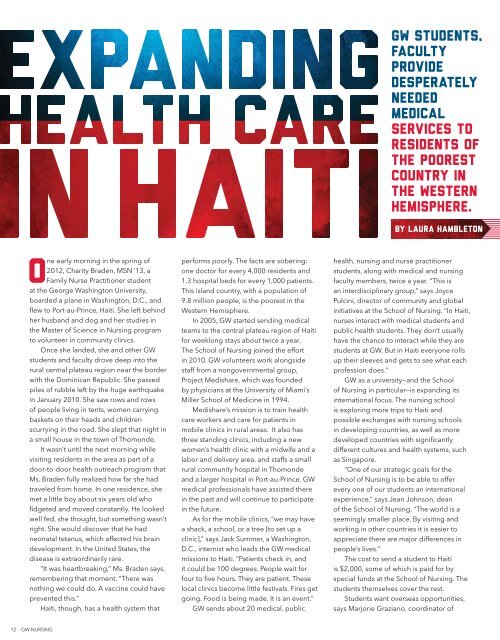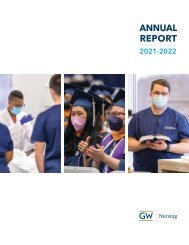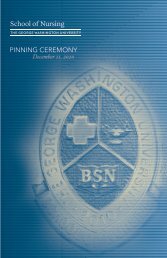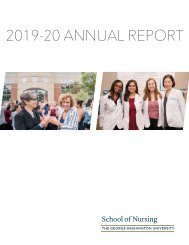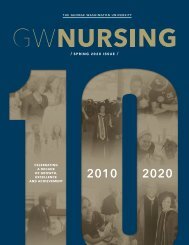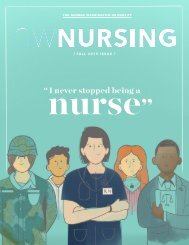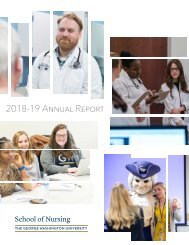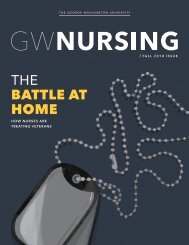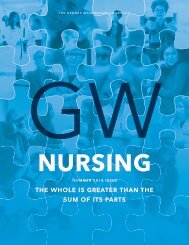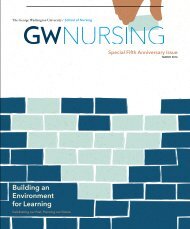GW Nursing Magazine Spring 2013
GW Nursing is a publication of the George Washington University School of Nursing. The magazine tells the story of GW nurses and their endeavors in the areas of education, research, policy and practice.
GW Nursing is a publication of the George Washington University School of Nursing. The magazine tells the story of GW nurses and their endeavors in the areas of education, research, policy and practice.
Create successful ePaper yourself
Turn your PDF publications into a flip-book with our unique Google optimized e-Paper software.
<strong>GW</strong> students,<br />
faculty<br />
provide<br />
desperately<br />
needed<br />
medical<br />
services to<br />
residents of<br />
the poorest<br />
country in<br />
the Western<br />
Hemisphere.<br />
By Laura Hambleton<br />
One early morning in the spring of<br />
2012, Charity Braden, MSN ‘13, a<br />
Family Nurse Practitioner student<br />
at the George Washington University,<br />
boarded a plane in Washington, D.C., and<br />
flew to Port-au-Prince, Haiti. She left behind<br />
her husband and dog and her studies in<br />
the Master of Science in <strong>Nursing</strong> program<br />
to volunteer in community clinics.<br />
Once she landed, she and other <strong>GW</strong><br />
students and faculty drove deep into the<br />
rural central plateau region near the border<br />
with the Dominican Republic. She passed<br />
piles of rubble left by the huge earthquake<br />
in January 2010. She saw rows and rows<br />
of people living in tents, women carrying<br />
baskets on their heads and children<br />
scurrying in the road. She slept that night in<br />
a small house in the town of Thomonde.<br />
It wasn’t until the next morning while<br />
visiting residents in the area as part of a<br />
door-to-door health outreach program that<br />
Ms. Braden fully realized how far she had<br />
traveled from home. In one residence, she<br />
met a little boy about six years old who<br />
fidgeted and moved constantly. He looked<br />
well fed, she thought, but something wasn’t<br />
right. She would discover that he had<br />
neonatal tetanus, which affected his brain<br />
development. In the United States, the<br />
disease is extraordinarily rare.<br />
“It was heartbreaking,” Ms. Braden says,<br />
remembering that moment. “There was<br />
nothing we could do. A vaccine could have<br />
prevented this.”<br />
Haiti, though, has a health system that<br />
performs poorly. The facts are sobering:<br />
one doctor for every 4,000 residents and<br />
1.3 hospital beds for every 1,000 patients.<br />
This island country, with a population of<br />
9.8 million people, is the poorest in the<br />
Western Hemisphere.<br />
In 2005, <strong>GW</strong> started sending medical<br />
teams to the central plateau region of Haiti<br />
for weeklong stays about twice a year.<br />
The School of <strong>Nursing</strong> joined the effort<br />
in 2010. <strong>GW</strong> volunteers work alongside<br />
staff from a nongovernmental group,<br />
Project Medishare, which was founded<br />
by physicians at the University of Miami’s<br />
Miller School of Medicine in 1994.<br />
Medishare’s mission is to train health<br />
care workers and care for patients in<br />
mobile clinics in rural areas. It also has<br />
three standing clinics, including a new<br />
women’s health clinic with a midwife and a<br />
labor and delivery area, and staffs a small<br />
rural community hospital in Thomonde<br />
and a larger hospital in Port-au-Prince. <strong>GW</strong><br />
medical professionals have assisted there<br />
in the past and will continue to participate<br />
in the future.<br />
As for the mobile clinics, “we may have<br />
a shack, a school, or a tree [to set up a<br />
clinic],” says Jack Summer, a Washington,<br />
D.C., internist who leads the <strong>GW</strong> medical<br />
missions to Haiti. “Patients check in, and<br />
it could be 100 degrees. People wait for<br />
four to five hours. They are patient. These<br />
local clinics become little festivals. Fires get<br />
going. Food is being made. It is an event.”<br />
<strong>GW</strong> sends about 20 medical, public<br />
health, nursing and nurse practitioner<br />
students, along with medical and nursing<br />
faculty members, twice a year. “This is<br />
an interdisciplinary group,” says Joyce<br />
Pulcini, director of community and global<br />
initiatives at the School of <strong>Nursing</strong>. “In Haiti,<br />
nurses interact with medical students and<br />
public health students. They don’t usually<br />
have the chance to interact while they are<br />
students at <strong>GW</strong>. But in Haiti everyone rolls<br />
up their sleeves and gets to see what each<br />
profession does.”<br />
<strong>GW</strong> as a university—and the School<br />
of <strong>Nursing</strong> in particular—is expanding its<br />
international focus. The nursing school<br />
is exploring more trips to Haiti and<br />
possible exchanges with nursing schools<br />
in developing countries, as well as more<br />
developed countries with significantly<br />
different cultures and health systems, such<br />
as Singapore.<br />
“One of our strategic goals for the<br />
School of <strong>Nursing</strong> is to be able to offer<br />
every one of our students an international<br />
experience,” says Jean Johnson, dean<br />
of the School of <strong>Nursing</strong>. “The world is a<br />
seemingly smaller place. By visiting and<br />
working in other countries it is easier to<br />
appreciate there are major differences in<br />
people’s lives.”<br />
The cost to send a student to Haiti<br />
is $2,000, some of which is paid for by<br />
special funds at the School of <strong>Nursing</strong>. The<br />
students themselves cover the rest.<br />
Students want overseas opportunities,<br />
says Marjorie Graziano, coordinator of<br />
12 <strong>GW</strong> NURSING


